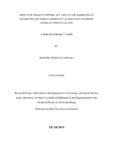| dc.description.abstract | Tobacco control activists often meet serious opposition in defending the tobacco control Act that imposes advertising restriction on the marketing of cigarettes and tobacco products. Achieving the restriction or banning of tobacco advertising is one of the fiercest battles to undertake with due to sociological issues surrounding tobacco products. Tobacco lobbyists usually assert that advertising does not increase the overall quantity of tobacco sold. Rather, the tobacco industry maintains that advertising merely enhances the market share of a particular brand, without recruiting new smokers. Previous studies on tobacco control have largely focused on the health implications of unrestricted advertisement of the tobacco products. This study however deviates from these approaches by focusing on business implications of restrictions thus the main objective to investigate the effects of Tobacco Control Act on the marketing of cigarettes and tobacco products in Kenya in the context of the Tobacco Control Act 2007 using BAT (K) as the study site. This study adopted a case study design which brought an understanding of a complex issue or object and can extend experience or add strength to what is already known through previous research. It also emphasizes detailed contextual analysis of a limited number of events or conditions and their relationships. The researcher used questionnaires and observation schedules to collect data that was required to answer the research questions. The questionnaires were administered to the selected respondents through face to face interviews at their departments of work. An observation checklist was used to collect data at different times at different locations within the company. The research questions in this study were also answered with the use of documentary sources that were already available in records. The qualitative data collected were cleaned, coded and edited. Simple descriptive statistics were used to organize, analyze and interpret the data. Where applicable the data were tabulated to aid in summary and presentation. Analysis was done by coding against each key variable or theme in accordance with study objectives.
The study findings indicated that BAT (K) has adopted and fully complied with the norms and enforcement practices set out in Tobacco Control Act. The study also indicated that the company faced many challenges in its endeavor to comply with the tobacco products regulations and had not relented on its efforts to be compliant with the Act despite the many challenges. Further the study revealed that the company had adopted alternative marketing
xiii
strategies that were all within the law and were legal avenues and business practices that all companies apply in their endeavor to meet their business objectives. Finally the study revealed that advertisement restrictions on the marketing of cigarette and tobacco products had a negative effect to the company since the marketing teams had limited options of marketing their products as well as interacting with their customers which is normally a key factor for any successful business so as to avoid business to customer disconnect. The restrictions had also failed to recognize the fact that tobacco is a drug that is consumed legally and has other uses other than smoking. This raises the question as to why the Act restricts marketing of a product that is legally consumed and has other substantial uses. The restrictions did not look at the sociological issues that surrounds tobacco products consumption the fact that people smoke because they want to it is a choice they make well aware of the consequences and not a factor of advertising. The study recommends the review of tobacco control Act since it criminalizes a legal business that contributes significantly to the country in terms of revenues employment as well as services through corporate social responsibility.
Finally this study was informed by academic goals and was not intended at collecting intelligence for law enforcement or ethical issues related to business operation practices. This study was rather informed purely by academic goals only and can only to be used for academic reasons only. The findings are limited to academics purpose only and cannot be used for any other purpose other than pursuit of academic goals but can be generalized to other companies that deal with processing, manufacturing and marketing of tobacco product. | en_US |

